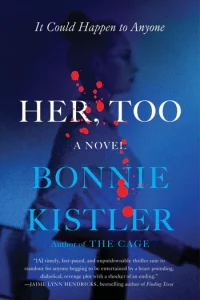Kelly McCann is a superstar lawyer in the legal/psychological thriller Her, Too: She wins every single case, and each one brings her kudos, cash, and controversy. That’s because she defends wealthy men accused of sex crimes and in the courtroom she’s merciless, brutal.
We first see her basking in triumph at a Philadelphia courthouse after a jury acquits the Big Pharma billionaire scientist she’s defending against several charges of rape. The media is out in full force and she could be a Roman Emperor accepting the adulation of the masses–even the protestors prove how famous she is.
She lived to win. It was the entire secret of her success. Her courtroom victories weren’t due to any great brilliance on her part. She had no more talent than the average lawyer. What she did have was this abiding lust for victory.
But the Wheel of Fortune turns very quickly in her case and she’s soon the victim of a grotesque sex crime herself, something unimaginable. Thankfully the author doesn’t feel the need to dwell on the details, but what she does do beautifully is portray the new trap Kelly finds herself in and the emotional damage that she suffers.
How can she be free? Revenge would be a start and the book takes on the feel of a caper as she tries to assemble just the right team to take on her assailant and destroy his reputation and his business. But she’s out of her depth and is soon shocked by a series of threatening surprises. Readers might be surprised themselves by some of the twists the story takes and how Kelly changes–and in the identity of the novel’s murderer. I sure was.
The novel is strongest when it stays in Kelly’s head or in the head of her investigator Javier because they are far more interesting and complex than the people around them. Nonetheless, Her, Too is a deeply moving, gripping tale of power run amok and how its victims can fight back, as told by a former attorney who knows the legal system inside out. It’s also the age-old tale of what happens to overweening pride.
Kistler is a masterful storyteller and I did not want to put the book down. That may be a cliché, but it’s true. ★★★★
Lev Raphael is the former crime fiction reviewer for The Detroit Free Press and the author of 27 books including 10 Nick Hoffman Mysteries.



